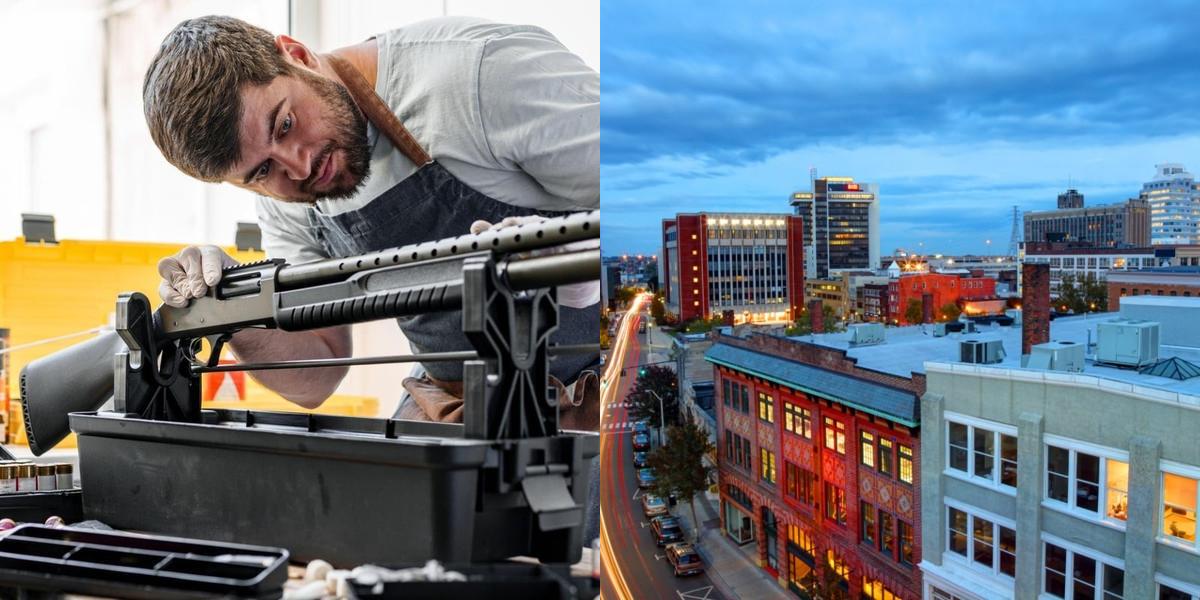How to Become a Gunsmith in Connecticut (2024)

Gunsmiths are skilled professionals who specialize in the repair, maintenance, and customization of firearms. They possess a deep understanding of various types of guns and possess the necessary skills to diagnose and fix any issues that may arise. If you are passionate about firearms and have an aptitude for mechanics, becoming a gunsmith in Connecticut might be the perfect career path for you!
Summary:
- Gunsmiths are skilled tradespeople who design, build, and repair firearms.
- Gunsmith training programs in Connecticut typically take about a few months to 2 years to complete, depending on your chosen schedule.
- To work as a Gunsmith in Connecticut, you must complete an approved training program and pass the Federal Firearms License (FFL) exam.
- The average Gunsmith annual salary in Connecticut is around $53,000 as of June 2024.
Career Paths and Opportunities after Becoming a Gunsmith
Becoming a certified gunsmith opens up a variety of career paths and opportunities in the firearms industry. Here are some of the potential avenues you can explore:
-
Gunsmith Shop Owner: With the right skills, experience, and entrepreneurial spirit, you can open your own gunsmith shop. Running your own business allows you to have full control over your work and offers the opportunity to build a loyal customer base. However, it requires not only excellent gunsmithing skills but also business acumen, marketing knowledge, and customer service expertise.
-
Employment at a Gunsmith Shop: Many gunsmiths find employment at established gunsmith shops or firearm manufacturers. This provides a stable work environment, access to a variety of firearms, and the opportunity to learn from experienced professionals. Working at a reputable shop can also enhance your reputation and credibility within the industry.
-
Firearm Manufacturer: Gunsmiths with advanced skills and experience may find employment with firearm manufacturers. These positions involve working on the production line, assembling firearms, or performing quality control inspections. Working for a manufacturer can provide valuable insights into the manufacturing process and allow you to specialize in specific models or firearm types.
-
Custom Gun Making: If you have a passion for creativity and craftsmanship, specializing in custom gun making can be a rewarding career path. Custom gun makers work closely with clients to design and build one-of-a-kind firearms tailored to their specifications. This requires a high level of skill, attention to detail, and artistic flair.
-
Restoration and Antique Firearms: Antique firearms hold a special allure for many enthusiasts. Specializing in the restoration and repair of antique firearms can be a niche career path within gunsmithing. This involves working on valuable and historically significant firearms, preserving their originality, and ensuring their functionality.
-
Law Enforcement and Military: Gunsmiths with specialized training and experience may find employment with law enforcement agencies or the military. These positions involve maintaining and repairing firearms used by police officers, military personnel, and other security forces. Working in this capacity requires a thorough understanding of firearm regulations and strict adherence to safety protocols.
-
Teaching and Training: Experienced gunsmiths may choose to share their knowledge and skills by becoming instructors at gunsmithing schools or training centers. This allows you to pass on your expertise to the next generation of gunsmiths and contribute to the growth and development of the industry.
Frequently Asked Questions
What degree do you need for gunsmith?
Usually, most people opt for a professional certificate to learn gunsmithing. Alternatively, you could pursue an associate degree, but this involves taking additional courses like liberal arts to get a full-fledged college degree.
What state pays gunsmiths the most?
According to trusted job sites, Washington state is the top payer for gunsmiths in the U.S., offering an annual salary of about $62,982. New York and Vermont are not far behind, with average salaries of $55,831 and $54,822 respectively.
Does the military have gunsmiths?
Yes, the military does have specialists who handle weapon maintenance. However, they don't usually repair guns like a civilian gunsmith. Instead, they swap out faulty parts, send the weapon to a depot, or sometimes even discard it if it's not fixable.
Is gunsmith a good trade?
Absolutely! Gunsmithing is a great trade to consider. Guns are widely used and always in demand, so the need for expert gunsmiths is constant. This means you can enjoy a stable career fixing, upgrading, and taking care of firearms.
Do gunsmiths use math?
Yes, gunsmiths do use math. Gunsmiths use their math skills for measuring and calculating the dimensions of the guns. Along with other skills like sketching, mechanics, communication, and business know-how. They also gain unique skills like metalwork, engraving, welding, and understanding gun safety.
Final Thoughts
Becoming a certified gunsmith requires dedication, passion, and a commitment to continuous learning. It's a rewarding career choice for individuals with an interest in firearms and a desire to work with their hands. By following the steps outlined in this guide, you can embark on a fulfilling journey towards becoming a skilled gunsmith. Remember to always prioritize safety, stay updated on industry advancements, and never stop honing your craft. Good luck on your gunsmithing journey!
If this article doesn't match what you're looking for, you can check out these other articles:

Justine Tacmo is part of the Growth team at Dreambound. He assists the organization by updating critical information so students receive the most up-to-date information for their desired trade schools. Besides, he has a passion for writing and expresses it through poetry, covering themes of life, love, and mental health, which is also his advocacy.



